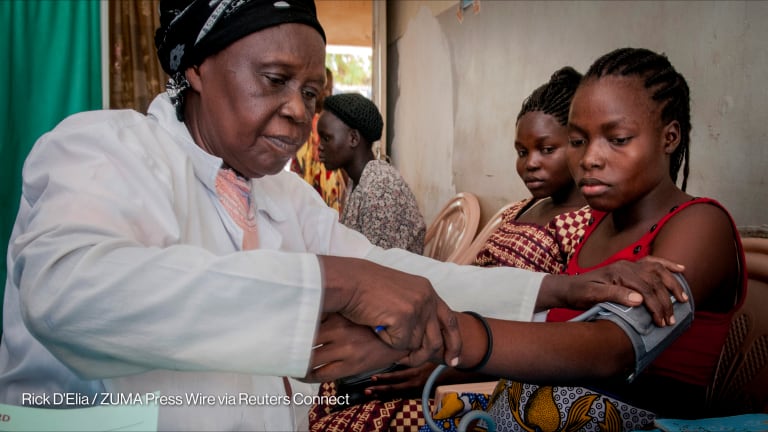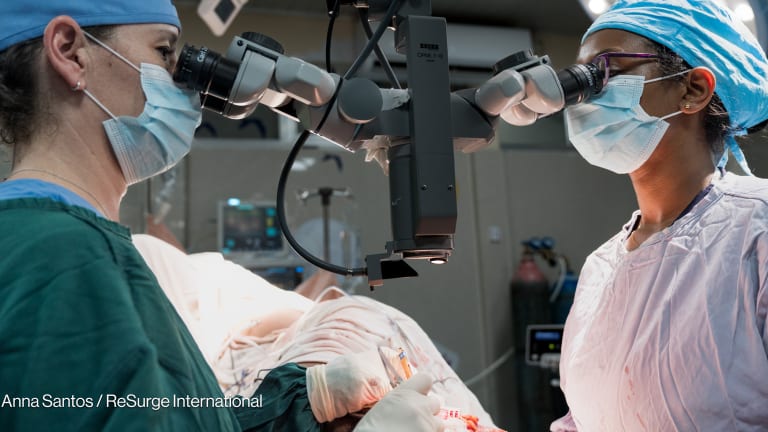
There is no question that many women live better lives thanks to expanded options for planning for healthy families.
Yet, too frequently, the brightest possibilities elude the poorest and most vulnerable women. They often live in rural areas, where care may be available in theory, but inaccessible in reality. As a result, we continue to see pregnancy complications, unsafe abortions and deaths.
The recently released Family Planning 2020 Commitment to Action Report notes the great strides made in improving access to high-quality family planning, but also highlights opportunities where we can do even more. A key element of reproductive health care is the actual care — delivered by well-trained doctors, nurses and midwives who are translating the global effort into local impact.
To meet global targets and provide the quality care women and girls need and deserve, we need a training transformation.
The world needs more health professionals who view reproductive health and family planning as integral to ensuring health throughout life. For this perspective to develop, integration of these areas must begin during medical, nursing and midwifery school. This concept, known as pre-service training, may not seem revolutionary and may even seem intuitive. In many places, however, hands-on experience in reproductive health care is not part of the schooling curriculum for health professionals.
Instead, new graduates might start serving communities having never counseled a woman about family planning options, nor provided lifesaving abortion services. In many developing countries — and particularly in rural areas — there are only a few health professionals serving an entire community. If these doctors, nurses and midwives do not have experience in reproductive health, the people they serve will not have access to that care.
Globally, we know that 225 million women and girls who want to use contraception cannot access it. Expanding reproductive health training for care providers is a critical step to addressing this unmet need.
Where reproductive health is not integrated into medical education, there is a reliance on in-service training after graduation. In the medical field, in-service training is critical and helps ensure health professionals keep their skills sharp. These trainings, however, should not be the first opportunity to learn the full range of skills needed to provide reproductive health care. Pre-service training offers an opportunity to reach more doctors, nurses and midwives earlier — cost-effectively and efficiently.
Ethiopia — where I grew up, attended medical school and worked as an obstetrician and gynecologist — is one of many countries that has relied on the in-service approach for reproductive health training. It also has one of the highest maternal mortality ratios in the world and, according to the Ministry of Health’s 2008 Health Indicators Survey, only one specialist in obstetrics and gynecology per 1.8 million people. As a medical professional, it was devastating to see women suffer and die from causes that could have been prevented by access to quality care.
In 2014, the Center for International Reproductive Health Training was established to ensure that, from the very start of their careers, aspiring doctors, nurses and midwives have the skills to save and support women. Based at the University of Michigan, CIRHT is partnering with faculty at nine Ethiopian medical schools to implement an integrated curriculum in reproductive health that emphasizes clinical training, client service and research. These partnerships also aim to create an enabling environment for competency-based, hands-on training by renovating and equipping skill labs and family planning clinics in teaching hospitals. Students and interns work under supervision to build both the technical and counseling skills needed to provide quality service.
The new FP2020 report indicates that demand for family planning in Ethiopia has increased by more than 5 percent in the past three years — one of the highest national increases documented. Our health care providers must have the training needed to meet this demand. With nearly 6,000 medical students enrolled in CIRHT’s partner schools, I am eager to watch their lessons change how they provide care and the impact this will have on families and communities.
These new health professionals will be prepared to offer a wider range of contraceptive and family planning methods, as well as guidance on how and why to space pregnancies. This pre-service training also enables more health professionals to provide safe abortion services. With more professionals trained to provide comprehensive reproductive health services, integrating training expands access to care, helping us to finally reach the poorest and most vulnerable. This will not only save lives, it will change lives and help women live the lives they want.
Combining the strengths of these Ethiopian medical schools, the MoH, the University of Michigan and organizations focused on women’s health, I know pre-service training will catalyze powerful change in Ethiopia. I also know that what makes this approach exceptional — the range of services and the client-centered mentality through pre-service training — is just as applicable and needed in other countries. Trained providers help improve access to life-changing reproductive health care for women and girls throughout all stages of life — creating a brighter future that expands beyond individuals to empower families, communities and countries.
To read additional content on global health, go to Focus On: Global Health in partnership with Johnson & Johnson.
Search for articles
Most Read
- 1
- 2
- 3
- 4
- 5








